- February 26, 2024
Mason bioengineering majors hope that their capstone project will help individuals with prosthetic limbs live more comfortable lives.
- February 19, 2024
Bioengineering undergraduates demonstrate how a virtual reality-based physical rehabilitation system can improve patient outcomes.
- January 25, 2024
A Mason team including a high school student, a postdoctoral scholar, and a mechanical engineering professor has developed a way to use spent coffee grounds to remove diverse contaminants from water.
- December 11, 2023
Dulcee Valenzuela, a December 2023 grad with a degree in bioengineering, said her cancer diagnosis as a teenager helped her find her life's purpose and a career path.
- July 13, 2022
Mason faculty member Quentin Sanders, who holds a joint appointment in the Bioengineering Department and the Mechanical Engineering Department, describes his work, his inspiration, and how he sees his research impacting the future.
- March 30, 2023
George Mason University researchers are taking advantage of DNA molecules’ self-assembly properties to develop vaccines rapidly, publishing their findings in Communications Biology
- October 20, 2022
A study led by bioengineering professor Giorgio Ascoli has received $250,000 in funding from the U.S. Department of Energy. The project will make use of a massive open-source repository called Hippocampome maintained by Ascoli’s lab.
- December 14, 2022
Mason researchers Jeffrey Moran in the Department of Mechanical Engineering, Rémi Veneziano in the Department of Bioengineering, and Monique van Hoek, a microbiologist in the School of Systems Biology, won the NBIB R21 Trailblazer award. The team will research methods to dissolve harmful biofilms.
- August 31, 2022
Bioengineering student John Mutersbaugh shares about his experience in BESIP, a competitive internship offered through NIH for undergraduate biomedical engineering students across the U.S. who have completed their junior year of college.
- April 12, 2022
Bioengineering undergrad Medhini Sosale wins one of the highest rewards—the Goldwater Scholarship—in the U.S. for undergrad students interested in developing STEM research careers.










